In the Woods Beneath the Cherry Blossoms in Full Bloom (which is quite a mouthful so, from this point on, I shall refer to this arc simply as Cherry Blossoms) is a metaphorical story of man versus woman, rustic masculine ideality versus progressive feminine liberation.
Before we continue, I would like to warn you that I am attempting to go beyond a surface reading of the text. More importantly, I am not considering author intentionality (to be honest, this blog never has). I’m well aware of Ango Sakaguchi’s views, but authors often convey meanings they never intended. We could see Cherry Blossoms as a rant against modernization, urbanization, etc., but I think such a literal interpretation fails to account for many of the nuances in Madhouse’s complex adaptation. I am aiming for a more complete look at the arc. Please don’t disregard what follows as trolling or intellectual masturbation.
Shigemaru, the burly bandit with his amazing strength and speed, is essentially the lord of his forest kingdom. At the center of his power is his manliness.
He wields dominion over seven (if you include the loli-ish girl) women, but consider also how he defeats his opponents. By stripping men down to their underwear, he effectively emasculates them. For all his masculinity, however, Shigemaru is pathetically afraid of the blooming of sakura trees.
If manliness is Shigemaru’s power, the real threat behind the blooming sakura must be femininity.
Nothing could be more overt than the sakura tree bleeding from the inside out as if it is menstruating. More appropriately, the true threat to Shigemaru’s manliness is women’s “blooming liberation.” Women’s increase in power in an equilibrium means only one thing: the decrease in Shigemaru’s power.
It is rather curious at first glance, therefore, that Shigemaru should desire Woman (I don’t think her name was ever given so I’ll refer to her from this point on as Woman) to be his wife,
but recall that when he first meets Woman, a single sakura petal falls across the screen. She is, after all, from the city, the site of moral decadence. It is in the city where Shigemaru, as we shall see in the second episode of the arc, is absolutely impotent. His brute strength alone gives him no power where one can only survive with equal parts cunning and intelligence. Shigemaru immediately decides to take Woman to be his wife as an act of domination. If he could subjugate her, he could overcome his fears of women’s liberation and, therefore, the fear of his declining masculinity.
Note, however, that upon the unveiling of his new wife, Shigemaru’s expression changes from manly stoicism to shock and surprise, two vulnerable emotional states. I would surmise that what accompanies women’s blooming liberation is also a sense of psychosexual freedom. As a result, Shigemaru is stunned before her sexuality, allowing her to dominate him into fulfilling her every whims and desires.
What separates Cherry Blossoms from other “rawr girl power!” stories, however, is that Woman is equally flawed. She is the female rapist in this story to counterbalance Shigemaru. First, it’s fairly obvious that Shigemaru is a rapist.
His emasculation of others renders upon them sexual shame as they cower before and attempt to hide their practically naked bodies.
He utters, “Just strip already,” familiar words of a rapist to his victim. And of course, we can assume he forcefully took those seven women at home to be his wives. If we’re going to pretend he just wanted them to hang out in his home for no ill reasons, we’d be incredibly naive. The important thing to highlight here is control; before his first meeting with Woman, Shigemaru is firmly in control of himself and all those who dared to enter his forest kingdom. Enter the female rapist.
His first bestial act was the wanton murder of Woman’s two helpers despite being a self-proclaimed “nice bandit.” Using her sexuality and intellect, Woman proceeds to repeatedly egg Shigemaru throughout the two episodes into losing control again–to give in further to his bestial nature. He essentially becomes her pet from the moment he fetches her hairpin against all odds (trust me… searching for a hairpin on a vast riverbed is not an easy task). Recall her words:
Everything on this mountain is yours, isn’t it? If it is, you should be able to retrieve my hairpin. Or can you only collect ferns?
I don’t find it inconsistent that she should desire the deaths of the other wives. She later remarks in the next episode that she would like him to get her the head of a shrine maiden. In a sense, she’s using him to murder the traditional ideality of Japanese femininity, i.e. she sees them as inferior women. As inferior women, however, they also serve to uphold patriarchal domination. These women are a threat to Woman’s liberation and, as a result, she has them killed.
Moving Shigemaru to the city only serves to render him increasingly impotent. Rape is not (typically) about sexual fulfillment. Rather, it is about control–it is about domination. Woman does not need to physically rape Shigemaru; by making him utterly submissive, she has turned the tables against tradition through her sexuality.
In Shigemaru’s rant regarding city life, we see an honest confession of misogyny. Like the city, a liberated woman represents the unknown. Shigemaru bitterly remarks,
Shigemaru shortly laments later, “…look at how pitiful I am. I can’t hunt and I’m not smart enough to do business.” Removed from the forest and within the artificial confines of law and society, man’s advantage over the female sex diminishes. Of course, powerful men in the city exist, but they achieve their dominance through means that Shigemaru admittedly finds impossible. After all, he’s only a country bumpkin.
At one point, Woman leaps at Shigemaru with a drawn blade. Although her silly attack failed, Woman smirks not because she has been defeated, but because she knows deep down inside that she doesn’t need physical strength to dominate Shigemaru. Her mind games continue, pushing him, at this point, to murder again and again. An interesting moment has Shigemaru in drag.
On the surface, he has to be in drag to complete the murder, but by this point, we should be able to see this gender reversal as simply another example of his increasing loss of control over the sexual games between him and Woman. Her fetish for the heads is nothing more than another aspect of her mental dominion over others in her lives, Shigemaru included.
“In that instant, he realized. The woman was a demon.” Or does he? Unfortunately, many will take the demon interpretation literally. I, on the other hand, see it as a red herring. Consider the story’s many anachronisms (Shigemaru listening to what looks like Ipod earphones, Shigemaru telling a third party to “use the right footage”). The story is telling us that this is pure fantasy. Shigemaru’s wife turning into a demon is thus another fantasy. From Shigemaru’s point of view, her dominion over him is unnatural, un-womanly, and obviously the result of a demon at play. Woman’s liberation is perhaps nothing more than a subversion of all things right and moral. There is no doubt that Woman is an evil character; she is materialistic, selfish and complicit in Shigemaru’s acts of murder. These are, however, still human flaws. Human beings are capable of such atrocities, but by rendering Woman a demon, the story dismisses the notion that a woman could sink to such lows. It stunts her free will and thus her humanity.
Why did Woman write a note saying that she’ll be back soon? Perhaps she became overconfident. Perhaps she felt she could strike and dominate Shigemaru again when he least suspects it, but deep in the forest yet amidst the blooming sakura, neither truly wins in their final struggle. She may have lost by dying, but she may have also won in another way.
His hair becomes undone and his stare is absolutely vacant. Shigemaru struggled mightily against Woman and thus becoming her pathetic pet, but in the end, his triumph is hollow. He has become the wild beast.
Upon self-reflection, Shigemaru looks down to see not Woman but himself sprawled on the ground like a rape victim. Rape turns the victim into an object, a tool to be controlled and manipulated by the transgressor. Men and women are, for all intents and purposes, virtually the same in every human aspect, i.e. human in the sense that these qualities exist only in us and not in animals. What truly separates the sexes are natural or, to put it in a more illustrative way, animalistic differences (i.e. strength, speed, the ability to bear children). At some point, Shigemaru realized he could never be on equal footing mentally with Woman. Perhaps other men could stand toe to toe with her in a complex chess game of mental wit, but not this country bumpkin, a fact that the story repeatedly hammers into the audience. As a result, his only trump card over Woman is his physical strength, one of the few animalistic differences between men and women (I think it’s safe to say men are generally physically stronger than women). I have argued up to this point, however, that bringing out the animal in Shigemaru is exactly what Woman wanted. As a result, we get such a double-sided, complex ending where Shigemaru is both victor and victim. He may have won, but an animal has no free will. Woman has ravaged him mentally, stripping Shigemaru of his humanity. Had he decided, however, not to become a wild animal, he would have just continued being Woman’s pet. Shigemaru was in a game he could never win.

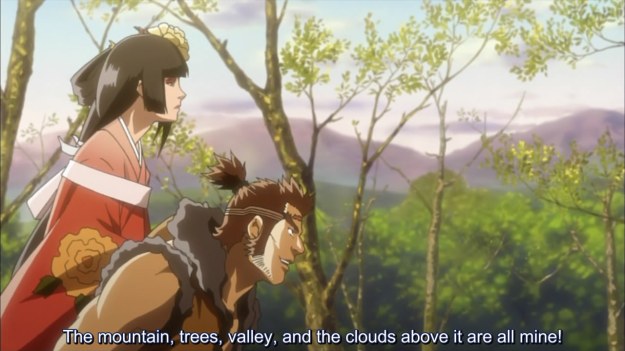


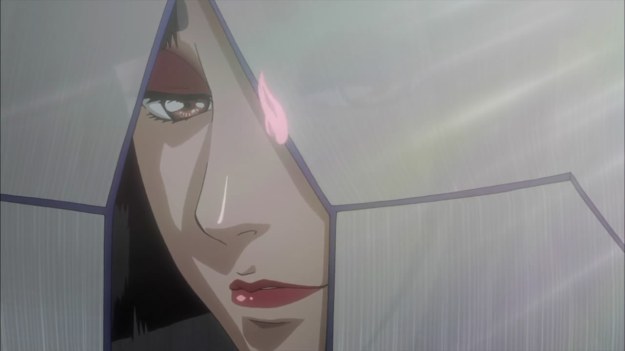
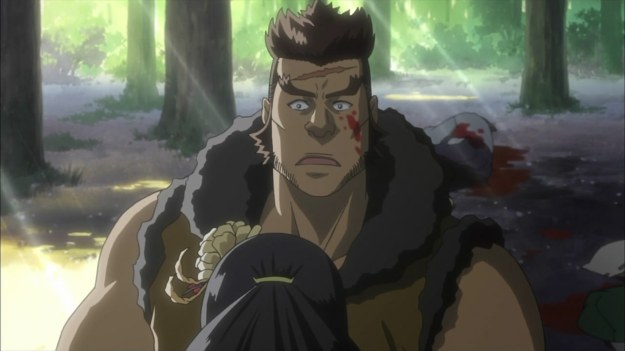
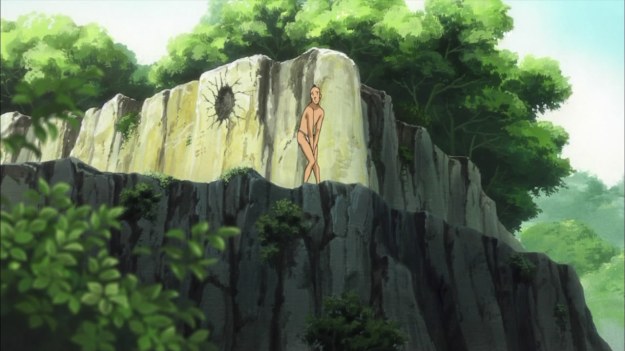
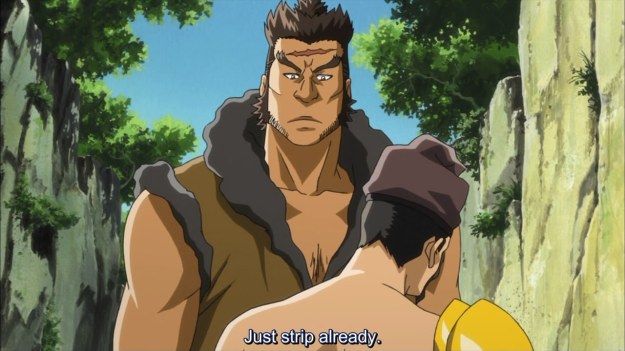
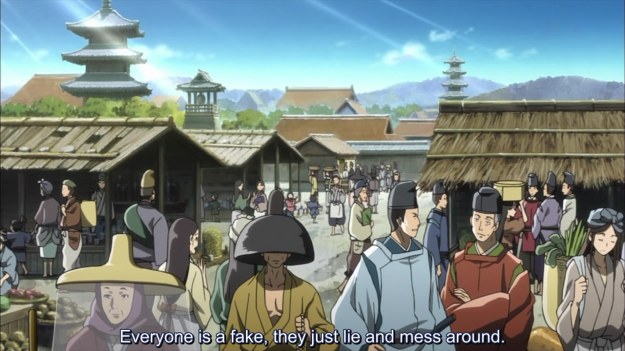
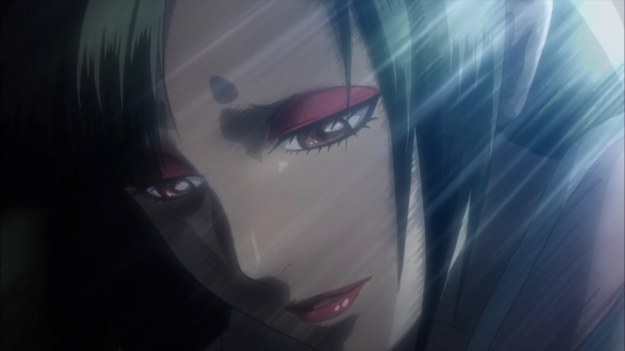



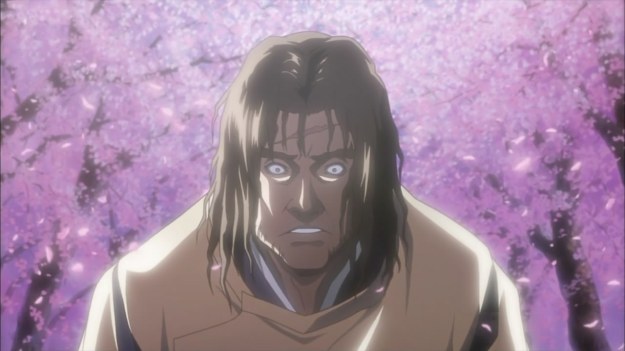
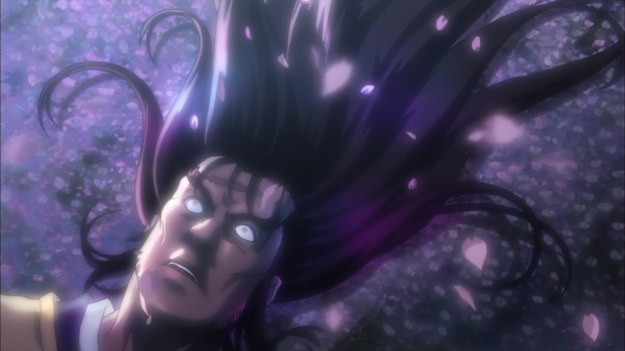
Sheesh, I gave this serious thought and no comments. Oh well, I should have learned my lesson after Eden in the East.
I’ve been away. Still am, technically.
I can’t say anything about episode six because I haven’t seen it, but VERY interesting observation about the bleeding sakura. That hadn’t occurred to me.
Also, I have no idea if ferns have the same sexual meaning in Japan as they do in the west, but what she says to him on the mountain sounds like a pretty direct sting: Get that pin, or you’re just a useless masturbator. Fun thoughts.
It’s not any specific comment I’m expecting, but just in general. I hope people don’t think I’m trolling (I’ll admit the Jungian take on Nyan Koi! was a joke); if the ideas in the article sound outlandish, I’m more than ready to defend my position.
I personally have never seen ferns used as a sexual connotation, but East and West overlap so much now, it wouldn’t surprise me if it was deliberate.
I took a look around Anime Nano for people’s thoughts on this arc and it disappoints me. People interpreted this so literally and they put far too much stock into author intentionality. I understand the urge to research the author and his views when one comes across a challenging text, but it is no longer the post war period. It is the 21st century and it is Madhouse who took it upon themselves to adapt this story in a certain way. Cherry Blossoms as a rant against Japan’s modernization is a coherent reading, but not a strong one and fails to understand, I think, the nuance of the ambiguous ending that makes this arc so compelling to modern day viewers.
I want to say that I really enjoyed reading your interpretation of this arc. I had similar thoughts about the adaptation being a clash between masculinity and femininity, but I definitely didn’t run with it as far as you have, haha.
It kind of surprises me that people would read the ending so literally. The abruptness of the ending combined with the ambiguity had me convinced right away that the whole demon angle is something Shigemaru conjured up to rationalize the woman’s behavior. As you write, it is as if he is saying, “Oh, she is a demon! That’s why she’s acting so strange! Totally OK to kill her now!”
One thing I’d like to add: A couple of aspects of the story had me thinking of “Rashomon”. First, the woman’s appearance and behavior reminded me of the samurai’s wife in her more unflattering portrayals during the movie. Second, the way the story is told is straight out of the “Rashomon” school of, “I’m going to frame this story to make myself look as good and sympathetic as possible.” Shigemaru is a killer, thief, kidnapper and as you write, in all likelihood a rapist, and yet the way he tells the story, he comes off as a much more sympathetic figure than the woman, when he really is not with whom it should be easy to sympathize.
Ah, I haven’t thought of comparing it to Rashomon. It’s an interesting idea, especially since “what really happened” is unclear in both stories. Cherry Blossoms in general really makes me appreciate Aoi Bungaku. The adaptations haven’t been perfect, as is the case in No Longer Human and Kokoro, but at least it’s a solid attempt for anime, a format typically full of brainless fanservice.
wow..you made this really well..actually this arc is one of the best in the series..and horrifying and bloody as well..hmm..but in general view all of the arcs are really good..i love aoi bungaku so much hehe ^^
btw..ive seen your fave anime list..hehe..,among all of them..i have just watched aoi bungaku and 5 cm per second..i havent finished full metal panic fumoffu >.<
well..anyway, i will watch the titles in your list if ever ive seen them in the sites where i watch online..you can reply in my blog if you want to :D
Awesome interpretation of the arc and well backed up.
Just wondering, what ARE the connotations behind a “fern”?
Haha.OH I LOVE YOUR REVIEWS,I AM NOT GETTING TIRED OF READING THEM.
It’s a nice different approach to the story.Actually if we had no clue about the author’s past,i believe your interpretation of the story and the symbolism that is consisted in it, would have prevailed over the interpration of man-woman=nature,wildness-human,war,greed that is approached by others.
Your articles are top and your usage of English makes me wonder that either have a degree in English literature(or sth affiliated with it) or you are a bookworm.
Ever heard of the male panic, E minor? something I came across in gender studies…this entry reminded me of that. Whenever the male ego’s sense of the gendered world is upended, he acts out to reassert his dominance – in this case violence. Almost as if to ensure the male-female binary. Oh geez, now I sound like a feminist…
anyways, great analysis! it’s always enlightening and enjoyable to read these posts :D
Nah, this is the first time I’ve heard of it. I regrettably never took a gender studies course in my undergraduate years.
Very good analyzing. You’re the man!
I like your interpretation way better than the author’s intentions! Very unique perspective.
I have never heard of this before coming across the picture of the cherry blossom tree I was going to use as a refrence for a screen board, and honestly only looked at your wordpress because of the title “moe sucks” (Im a fan even though I do have my own personal issues) and read your very poignant review and I definetly would like to find and see for myself, since I am always looking for something to make me think outside the box. Thank you for your very well expressed views.
wow again i read your article about Aoi bungaku although about different story yet now i feel even dumber that i felt when watching hashire melos – there i understood some of the meaning but i though that this part of anime is a disgrace but now that i think about it it isn’t . For me it’s not as good as other stories but still . I believe your ideas and way of thinking are right . Even in the beggining that ugly makeupped man with book says something about author and reasons behind this book and they correspond with things you said .
Finally getting around to watching Aoi Bungaku. Found No Longer Human a little hard to get through, to be honest, which is partially why it’s taken me this long to keep watching. I found it manically depressing, which is fine, but it didn’t really do anything to make me want to keep watching either. I’m getting into the swing of Aoi Bungaku now, though, and the more I ponder No Longer Human the better it sits in my memory, I’m glad I forced my way through it. Your posts make me want to read the book, actually, it sounds really fantastic. Thanks for these detailed posts, they’ve made for a great companion piece as I work my way through this.
Regarding Cherry Blossoms, I like your interpretation here. I was rather keen going into this one since the original story is written by the same guy that wrote the stories UN-GO is based off, and I just finished watching that one recently (and thoroughly enjoyed it). I know it’s been a long time since you watched this, but what is your take on all the anachronisms in this adaptation? I can’t quite parse the significance of the ipod earphones, and the people whipping out their phones to take a picture of Shigemaru. Also, I find it interesting how differently this story wan handled to No Longer Human. It felt a lot more… Anime. We have the loli-ish girl with the big glasses, people going super-deformed, more extreme expressions and reactions. To be honest, the tone felt inconsistent at points for me. I wonder why MADHOUSE decided to modernise, anime-ify and generally add more levity to their adaptation of this story.
Thanks again for all the time and thought you put into this series of posts.
Well, thinking back on it now, I wonder if I hadn’t been too overly harsh about the adaptation because I constantly compared it to the book. My views on adaptations have evolved since then, so it’s hard to say I’d agree 100% with my old posts regarding No Longer Human. But yeah, it’s a good book though, but probably even more depressing than the adaptation itself.
It’s been a while, and I’d really have to rewatch these episodes to give an adequate answer. Still, if I had to make a stab in the dark, I believe I interpreted Cherry Blossoms as being somewhat feminist in its message. Well, feminism itself would be an anachronistic concept within the short story’s setting. So perhaps this is all related somehow.
I think, ultimately, Cherry Blossoms is a comedy of sorts. I know it ends in tragedy, but the tone isn’t dead serious like it was in No Longer Human. And as a comedy, you invite in the absurd whereas No Longer Human plays it pretty straight. Again, though, it’s been too long for me to really remember the specifics of Cherry Blossom to provide a good answer.